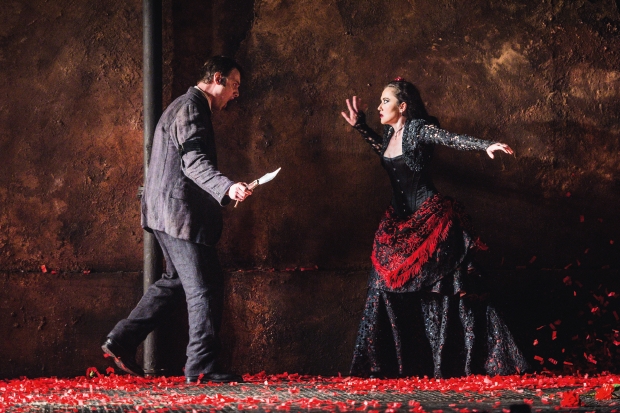Is it possible to write a feminist opera about Jack the Ripper? Composer Iain Bell thinks it is, and his Jack the Ripper: The Women of Whitechapel tries very, very hard to prove it. But while the result is respectful, topical and agonisingly, paralysingly sincere, it’s also a sheep in wolf’s clothing. You can’t have your victims and kill them too.
You have only to look at the opera’s title, bent awkwardly round its central colon, to see the conflict. Front and centre you have Jack the Ripper — a marketing department’s darling, promising Gothic horror and lashings of gore. Following behind (in slightly smaller type) you have his victims, the drab, downtrodden women whose lives and voices the piece hopes, laudably, to restore. You can have bloody, swaggering sensationalism or you can have a social-history lesson about the plight of the urban poor.
Having created an unpalatable choice between dignity and drama, Bell and librettist Emma Jenkins choose dignity, and their opera has a tang of duty about it that never quite goes away. Excising the killer from the story (the Ripper never appears on stage) leaves a wound at the centre of the narrative that no amount of sisterhood can staunch, leaving us wallowing in emotional platitudes. ‘I forgive you as you are,’ the five women sing to one another in a scene less suited to a filthy, flea-infested dosshouse than the dormitory of a girls’ boarding school. Compare it with the austere pathos of the Nieces’ ‘From the gutter’ in Peter Grimes and its softness seems far too cheaply won.
If a wrong-footed concept and under-developed characters send the drama lurching and stumbling — now procedural, now a courtroom drama, now an extended dream sequence — the missed opportunities of the music are less easily explained. Menace and violence are banished to the outskirts of a score that seems wilfully determined to seek out the light, to console where it should scream.
High woodwind glints offer decorative rather than unsettling dissonance (speaking louder of Britten’s Suffolk seas than of London’s East End) over washes of anonymous strings and female voices. The rasping boom of the cimbalom — to the absent Ripper as those famous two notes are to Jaws — is the only bold colour, but one all but synonymous in recent opera with George Benjamin. A sequence of set-pieces — a pub singsong, a curdled nursery rhyme, a mob chorus — are all well crafted and efficiently paced by conductor Martyn Brabbins, but leave little emotional trace.
Director Daniel Kramer rises to new heights with a competent production that leans heavily on Soutra Gilmour’s period sets, evocatively lit by Paul Anderson. It is filled with a vintage ENO cast — a wasteful sprawl of vocal riches including Susan Bullock and Lesley Garrett as a deliciously potty-mouthed pair of ‘daft trollops’, Janis Kelly, Josephine Barstow as Gothic villainess and would-be child pimp Maud — and that’s before you get to the luxury cast of men. Rising-star soprano Natalya Romaniw makes a blazing, uncompromising statement as heroine Mary — the last of the Ripper’s victims — but is undone by a queasy epilogue that tips us into baroque sentimentality.
If it’s possible to write a feminist Ripper opera, then this isn’t it. If you’re minded to honour his dead victims you’d do better to read Hallie Rubenhold’s recently published The Five (whose meticulously gathered fact does all that Bell and Jenkins’ essentialising fiction cannot) and save your opera-going for something else, like the Royal Opera’s new Berenice — the best night I’ve had in the theatre so far this year.
It’s an unlikely hit. An opera even experts concede is not Handel’s best (nor even close) explores rival thrones and lovers in Egypt and Imperial Rome. No sets clutter the Linbury Theatre, whose stage space is simply stripped and painted black. It’s a minimal, makeshift frame for the rich human colours of Adele Thomas’s production, which filters classical machinations through the egos and intrigues of Handel’s own 18th-century rehearsal room.
A trio of continuo musicians join the cast (all elaborate wigs and outré prints) on a curved velvet banquette that forms the entire set — a playground for Thomas’s elaborate games of cat-and-mouse with baroque conventions. Playful anachronisms and physical comedy abound, all minutely judged and brought to life with breathtaking precision by the ensemble cast, whose movements must be as precise as their music.
It’s bliss to hear soprano Claire Booth (Berenice) in period repertoire, breaking the baroque frame of her recitatives with contemporary inflection, matched gesture for gesture by co-conspirators Laurence Cummings and the London Handel Orchestra in the pit. But the show belongs to the cast’s two Jette Parker Young Artists — countertenor Patrick Terry, playing lovelorn wally Arsace for laughs and getting them every time, and soprano Jacquelyn Stucker, whose Alessandro must pivot the entire drama, turning it from brush-away comedy to heartbreaking sincerity in a scene. This she does dazzlingly — a silent stab more devastating than anything currently lurking in the shadows at ENO.






Comments